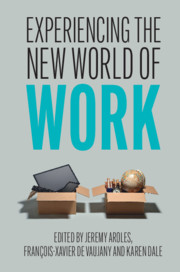Book contents
- Experiencing the New World of Work
- Experiencing the New World of Work
- Copyright page
- Contents
- Tables
- Contributors
- Foreword
- Introduction
- Part I Experiencing at Work
- Part II Digital Platforms and the New World of Work
- 5 Exploring Inequalities in Platform-Based Legal Work
- 6 Workers Inquiry and the Experience of Work
- 7 Digital Nomads
- Part III Politics, Imaginaries and Others in the New World of Work
- Conclusion
- Afterword
- Index
- References
7 - Digital Nomads
A New Form of Leisure Class?
from Part II - Digital Platforms and the New World of Work
Published online by Cambridge University Press: 24 December 2020
- Experiencing the New World of Work
- Experiencing the New World of Work
- Copyright page
- Contents
- Tables
- Contributors
- Foreword
- Introduction
- Part I Experiencing at Work
- Part II Digital Platforms and the New World of Work
- 5 Exploring Inequalities in Platform-Based Legal Work
- 6 Workers Inquiry and the Experience of Work
- 7 Digital Nomads
- Part III Politics, Imaginaries and Others in the New World of Work
- Conclusion
- Afterword
- Index
- References
Summary
Digital nomadism refers to a mobile lifestyle in which freelancers, digital entrepreneurs and remote workers combine work with continuous travel. In this chapter, we draw from Veblen’s Theory of the Leisure Class (1899) to explore whether digital nomads can be seen to constitute a new form of leisure class. In particular, this entails problematising digital nomadism through four dimensions, namely differentiation, emulation, visibility and institutionalisation. Drawing from a qualitative analysis of the mainstream promotional discourse underlying digital nomadism, we show the existence of a whole set of economic activities based on selling a dreamed work/lifestyle to others. These commercial propositions, which rely on online storytelling and visibility, constitute efficient means of emulation that contribute to framing images of success. Our ‘Veblen-inspired’ analysis, we contend, generates a source of questions not only relevant to the study of digital nomadism, but also to miscellaneous aspects of the new world of work.
- Type
- Chapter
- Information
- Experiencing the New World of Work , pp. 157 - 178Publisher: Cambridge University PressPrint publication year: 2021
References
- 24
- Cited by

